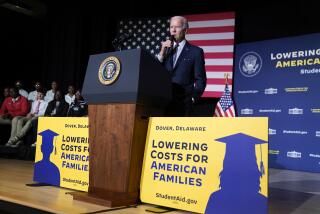Banks Offer Own Plan for Reducing Third World Debt
- Share via
WASHINGTON — The world’s big banks, seeking to blunt growing demands that they forgive much of the debt owed by Third World countries, offered Wednesday to write off more of such loans--but only if the United States and other countries provide them with new incentives.
In a 38-page report unveiled by the Institute of International Finance, which represents 186 large banks in the United States and 39 other countries, the bankers called for new government loan guarantees, bigger tax breaks for banks and less stringent banking rules.
Barry F. Sullivan, chairman of First Chicago Bank and head of the Washington-based IIF, argued that the banks need new inducements to provide such relief because debtor countries have not done enough to reform their economies and are not yet credit worthy on their own.
Bush Complaint
He also warned against mandatory debt-forgiveness schemes that would require banks to write down their Third World debt, reducing its value on their books, regardless of what the debtor countries do. He said that if such schemes were put into effect, many debtor countries would never be able to borrow in the marketplace again.
Wednesday’s proposal marked the first time that commercial banks as a group have formally offered to step up their voluntary writeoffs of Third World debt. Sullivan described it as “a major statement” on their part.
The document, described as a “consensus” proposal that reflects the views of all the larger banks, was designed to head off mounting pressure in Washington for commercial banks to take on a larger share of the burden of resolving the 6 1/2-year-old global debt problem.
Top U.S. policy-makers as well as those in debtor and creditor countries alike have conceded that the current strategy for handling the huge burden of outstanding loans is not working adequately and needs some revamping. President-elect George Bush has pledged a major review of the U.S. approach to Third World debt, and new proposals are expected in the next several weeks.
Bush has also singled out the commercial banks, complaining that they “haven’t loaned as much as they might” to Third World countries under the current debt strategy, known as the Baker Plan, after former Secretary of the Treasury James A. Baker III, who outlined it in the autumn of 1985.
That approach called for the banks to commit themselves to $29 billion in new lending to Third World countries between 1985 and 1988. Instead, they have lent about $10 billion--only enough for the debtor countries to keep up interest payments on previous loans.
Bush has ruled out any notion that the government might actually require commercial banks to forgive current Third World debt, but U.S. government policy-makers have signaled that they clearly want the banks to shoulder more of the burden of providing debt-relief to Third World countries.
Bush is expected to propose relaxing bank regulatory policies and providing new tax deductions to enable the banks to write down more of their Third World loans voluntarily--much as the banks now are asking. But some members of Congress are pressing for outright debt forgiveness.
Mandating that banks cancel their Third World debt, Sullivan charged Wednesday, would be “inequitable and politically impractical” and would hurt debtor countries in the long run by closing off the possibility that they could ever obtain new loans again.
As part of the banks’ proposal, he pledged that if the creditor governments provided new concessions, the banks would step up lending to developing countries--as well as writing down more loans voluntarily--and might even commit to lending for several years.
“The banks will deliver their piece of the action,” Sullivan said.
But he conceded that any such new lending is still likely to be well below its pace during the early 1980s--at least until the Third World governments put their economic houses in order. Over-lending in the early 1980s helped pave the way for the current debt problem.
Both Sullivan and Horst Schulmann, former West German deputy finance minister and managing director of the IIF, dismissed suggestions by critics that providing such new incentives for the banks--at taxpayers’ expense--would amount to a “bailout” of big banks.
Schulmann argued that since additional bank lending is essential to resolving the problem, “whatever makes (the banks) participate is a bail-in, not a bailout.” He added that if the debtor countries were to default on loans, it would cost taxpayers money eventually.
Part of the reason for the mounting pressure for banks to shoulder more of the burden is that they are financially stronger than they were and better able to write loans down. When the debt problem erupted in 1982, policy-makers feared that a default could spark a financial collapse.
In recent years, however, small banks have disposed of their Third World loans, while the big banks have built up reserves to cover themselves against possible defaults. For the past 2 1/2 years, policy-makers have regarded them as able to absorb sizable defaults.
The changes that Bush Administration officials are considering would ease tax laws and regulations requiring banks to count debt writedowns as business losses and replace them with provisions that would enable them to provide debt relief without being hurt.
So-called voluntary debt writedowns are those that result from negotiations between the banks and the debtor countries. In such cases, the debtor country often agrees to provide long-term bonds to the bank in return for discounting the debt to market levels.
More to Read
Sign up for Essential California
The most important California stories and recommendations in your inbox every morning.
You may occasionally receive promotional content from the Los Angeles Times.













